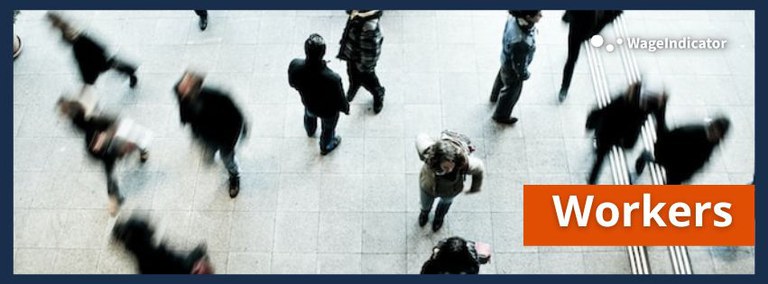
JOIN ‘A LEVEL PLAYING FIELD OF GIG WORKERS,’
WAGEINDICATOR’S NEW GIG WEBINAR ON OCTOBER 27, 2023
During the webinar ‘A Level Playing Field for Gig Workers,’ on October 27, 2023, we want to explore how gig workers can regain their negotiation power and build a collective voice.
We will address the issue from different angles: research and regulation, worker-owned cooperatives, and other solutions to help gig workers set up collective action and protect their labour rights.
Curious? Secure your spot by visiting the event’s webpage:
NEW PODCAST EPISODE
JAMES FARRAR AND THE WORKERS’ RIGHT TO DATA


For the Gig Work Podcast, platform expert Martijn Arets spoke to James Farrar, former Uber driver and British tech expert, who wants to equalize the balance of power by giving platform workers more knowledge and access to data.
He does this by uniting platform workers in the Worker Info Exchange and the App Drivers and Couriers Union: "Our struggle has only just begun," he said.

Dear reader,
We'd like to share some facts and articles from the past two weeks.
What is the connection between the United States and Brazil talking about platform workers?
You may have read that a group of riders coordinated a solidarity action in Brasilia and New York City, simultaneously projecting a video on the Brazilian National Library and Times Square to remind them they need basic protection.
The same day, U.S. President Joe Biden and Brazilian President Lula da Silva announced a new “Partnership for Workers’ Rights.” You will find this comment by Veena Dubal and Renan Kalil interesting.
As you can read on the Brazilian government’s website, “The goal of the unprecedented initiative by the two countries is to advance workers’ rights and stop worker exploitation. ” “Two countries’ joint activities with partners” will aim to “increase public knowledge of labor rights; promote new efforts to empower and protect the labor rights of workers on digital platforms; and strengthen the central role of workers.”
As Dubal and Kalil underline, “the partnership details remain unclear.” More than this, a central point has been missed: “As in the United States, the companies’ argument in Brazil for an intermediary category of worker — a substandard set of laws for their workforce — centers around the myths about what drivers’ want: independence and flexibility,” despite this worker category “limits social protections and pays workers by the piece.”
Therefore, the intentions of the partnership seem good, but we’ll see.
Moving back to Europe, as you can read on The Grocer, Getir has forged a Europe-wide partnership with Uber, so Uber Eats users can use the app to order Getir groceries.
Something similar, but on a smaller scale, had already happened between Deliveroo and Gopuff when the companies announced that over 3,000 of GoPuff’s everyday essentials would be added to Deliveroo’s website, “with customers able to receive the groceries in as little as 20 minutes.”
Gopuff struck an equivalent deal with Uber Eats in November last year. Later the same month, Zapp also partnered with Uber Eats.
Is there a trend? Yes, it is.
StartUps explains it well: “The takeaway food delivery aggregators have found it tough to generate profits from their models that have involved working with takeaway brands and restaurants where the margins are thin.” Grocery is proving particularly valuable as “it enables platforms to boost their existing business volumes.”
If you are looking for an interesting report to read, check this recent European Trade Union Institute study, where you can find out why there is a close correlation between the quality of traditional work and the concentration of online work.
Researchers Wouter Zwysen and Agnieszka Piasna told Equal Times that “on the map of the regions with the highest proportion of internet work, we find, for example, eastern and central Ireland, eastern Spain; southern Italy; central Bulgaria; north-western and central Romania.”
People living in an area with high unemployment are more likely to engage in online work. They choose to work via digital platforms because they don’t have other opportunities and usually get stuck in these jobs.
It’s unclear if the platform work serves as a stepping stone to more traditional careers: “These jobs do not seem to provide a way into better jobs for the most vulnerable workers,” researchers said.
To conclude, we cannot miss mentioning the District Court of Amsterdam ruling against Uber, according to which the company has failed to comply with the April 2023 Court of Appeal order. The case was brought by Worker Info Exchange (WIE) in support of the App Drivers & Couriers Union (ADCU). Uber should have provided more transparency in the automated decision to dismiss two drivers from the UK and Portugal. But it didn’t.
Yesterday, the District Court “ordered that Uber has forfeited uncapped penalty payments of 4,000 euros per day, which now stands at a total of 584,000 euros.”
“The failure to comply with the order is serious,” the judge said.
Only a few days earlier, we had published the interview with the founder of WIE and the ADCU, James Farrar, to bring attention to the impact of algorithms on the way gig workers earn and make ends meet.
Speaking of unfair dismissals and workers’ right to data, Farrar highlighted that knowledge is power, even in the platform economy: 'If one side has all the data, it can tell the rest whatever it wants.'
About the ruling: “Whether it is the UK Supreme Court for worker rights or the Netherlands Court of Appeal for data protection rights, Uber habitually flouts the law and defies the orders of even the most senior courts. Uber drivers and couriers are exhausted by years of merciless algorithmic exploitation at work.”
Have a nice day,
The WageIndicator Gig Team
Quote
“Higher compensation, including for an on-call time, need not be mutually exclusive with worker flexibility, and it is not irrational to pursue both goals simultaneously.”
(New York Acting Supreme Court Justice Nicholas Moyne ruled on the new minimum pay law raising the minimum wage for app-based food delivery workers to 18 dollars.)

India - Dunzo has reportedly announced a fresh round of layoffs, which is said to impact around 150-200 employees.
Italy - The Court of Milan declared the dismissals of 4,000 Uber Eats riders "illegitimate." After exiting the country in June 2023, the company will be forced to start a new phase of consultations with unions.
Spain - The Audiencia Nacional (National Court) has admitted the complaint filed by Élite Taxi, RidersxDerechos, and Taxi Project 2.0 against Uber Eats for the alleged crimes against workers and tax authorities.
The complainants accused Uber Eats of having abused the figure of the false self-employed, even after the entry into force of the Ley Rider, moving to temporary subcontracting and outsourcing all its activities to different companies. This way, it imposed extreme instability on the riders.
Did you know? Labour Inspection's actions against Glovo are expected to culminate in the second half of October when the Prosecutor's Office considers them. This results from the complaint RidersxDerechos and the Taxi Project 2.0 collective presented to denounce the alleged commission of crimes against the Treasury and workers hired as “false self-employed.”
US - A group of Minneapolis City Council members is trying to revive efforts to support ride-hailing drivers weeks after Mayor Jacob Frey vetoed an ordinance guaranteeing drivers increased wages.

The Netherlands - Uber doesn't have to hire drivers for the time being: on October 3, the Amsterdam Court of Appeal did not issue a final judgment in the case between the FNV union and the platform about the independence of drivers. It first wanted to consult the Supreme Court.
The court in Amsterdam ruled in favor of FNV two years ago, ordering Uber to employ its drivers and that they fall under the Taxi Transport collective bargaining agreement. Uber appealed.

Argentina - Buenos Aires has fined Rappi 59 million pesos for charging compulsory extra consumer fees when delivering online food orders. Rappi denied the accusations and will appeal to reject the million-dollar fine.
India
- The Delhi government, which is currently finalizing its cab aggregator policy, is considering requests from operators to allow them to charge surge prices during the morning and evening rush hours.
- Cab aggregators Ola, Uber, and Rapido are operating without a license in and around Bhubaneswar, the Odisha state capital city, and they are also using private two-wheelers, which is against the norms. For this reason, the Regional Transport Officer has filed a complaint against the companies.
Spain
- The Community of Madrid is working on the region's possible first regulation of transport vehicles with drivers (VTCs), including those operating on platforms like Cabify and Uber. The draft, which should be ready before the end of the year, aims to address abusive price increases during massive events such as festivals or concerts.
- The Ley Rider is not unconstitutional: the Constitutional Court rejected the appeal promoted by the political party Vox.
- The Catalonia Department of Territory and taxi representatives had a first meeting to start defining a regulation that would include VTCs and taxi companies like Cabify and Uber.
Uruguay - The city of Maldonado approved a series of measures to regulate the delivery service within the department. According to decree 4084/2023, delivery workers must prove to use an identified vehicle and take out life insurance.

Singapore-headquartered food delivery service Foodpanda, owned by the German Delivery Hero, confirmed that it is conducting its latest round of layoffs to become “more agile.” Grab has shown interest in acquiring it.
India
- Several customers accused the food delivery app Swiggy of charging a few rupees upwards on the final order amount. The company replied that the amount difference was due to a "technical bug."
- The Open Network for Digital Commerce (ONDC), which started its cab-hailing pilot in Kolkata in July, has already begun ride-hailing services in the south and is now looking to expand to cities in other parts of the country.
Indonesia - Ride-hailing and delivery giant Gojek is teaming up with Kereta Commuter Indonesia, one of the nation's leading commuter railway operators, to offer users of its super-app a one-stop shop for local journeys.
Nigeria - In partnership with the Nest Innovation Parl, Bolt has opened applications for the Bolt Den, a 25,000 euro seed fund to support Nigerian drivers aiming to begin an entrepreneurial journey and presenting a business plan.
Spain - Juan de Antonio, CEO and founder of Cabify, announced that in 2025, the company will only use vehicles without a combustion engine.
US - Uber is partnering with Los Angeles Yellow Cab and its affiliates in Southern California. Under the new partnership, taxis associated with LA Yellow Cab and its partner fleets will get bookings through the Uber app.

Argentina - PedidosYa workers in Comodoro Rivadavia went on strike to call for better working conditions.
Finland - Invoicing service companies have stopped paying tax-free travel expense reimbursements to couriers, heavily impacting the workers’ earnings.
Ireland - Food delivery workers in Dublin denounced being victims of assaults and robberies committed by local gangs of youths.
